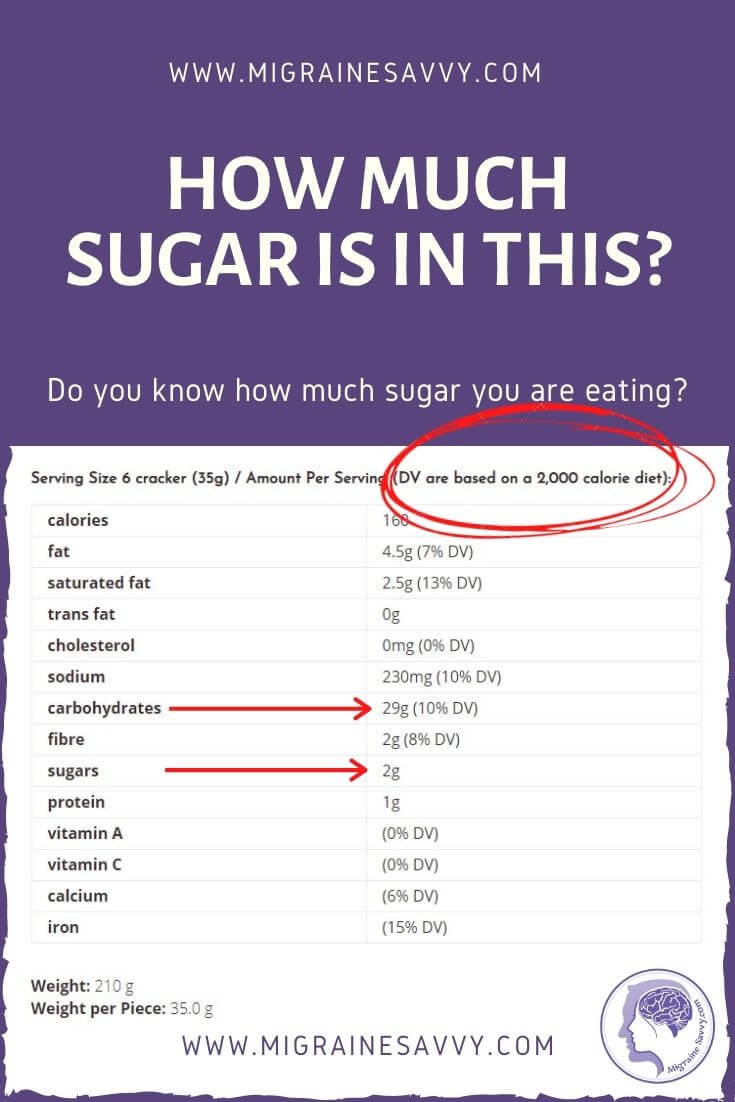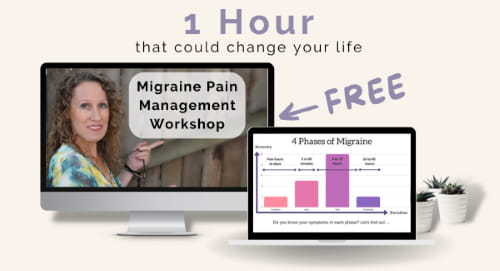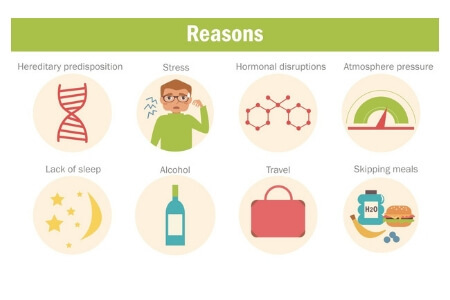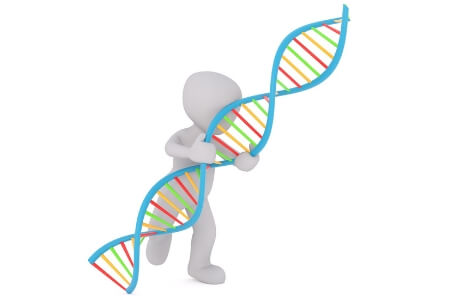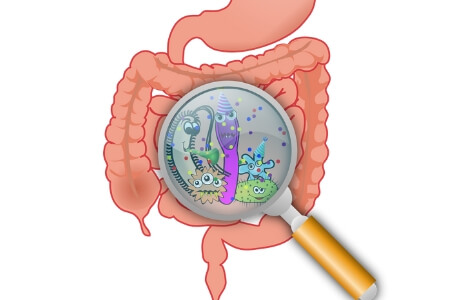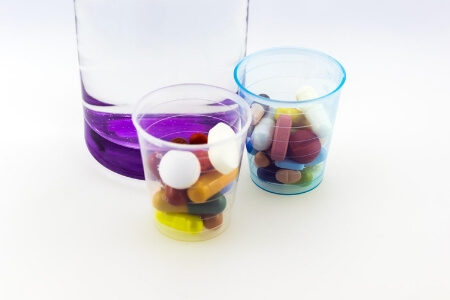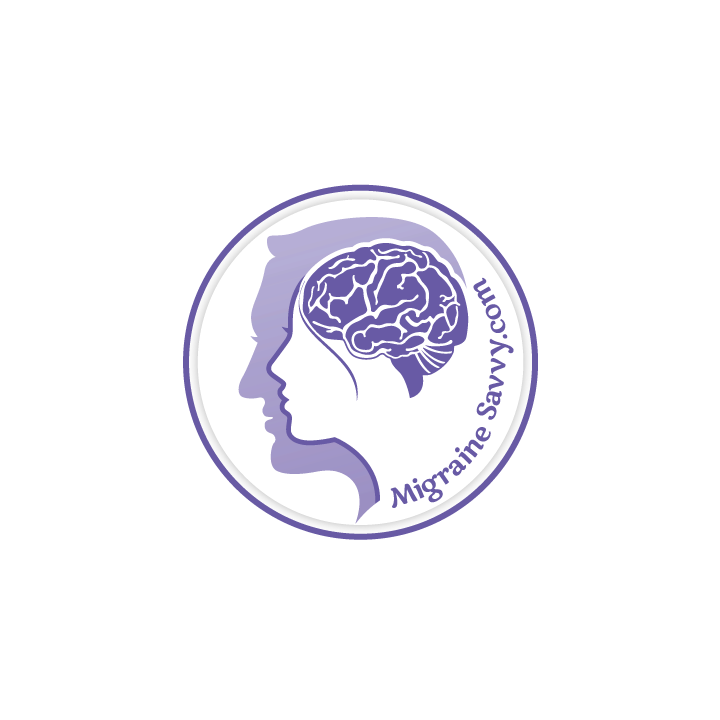does sugar cause migraine headaches?
Does sugar cause migraine headaches? Too much sugar, too little sugar? You may already know that almost anything can trigger a migraine attack, so why not sugar?
This is a great area of debate. There are different opinions around how much sugar, and what type of sugar, consumption can impact your migraine attacks. Different foods raise your blood glucose levels higher than others.
For me, it can be a major trigger. I recently researched a brand of crackers I absolutely love. And I discovered that each cracker had more than one teaspoon of sugar... each single cracker.
For the most part, experts agree that there is a connection between blood sugar levels and at least some migraine attacks.
So, let’s take a look at all of that... here's what you'll learn in this article:
- How much is too much?
- What foods raise our blood glucose levels?
- The link between sugar and migraine and does sugar cause migraine headaches?
- Why does sugar trigger an attack?
- Carbs...
- Foods surprisingly high in sugar.
- Top 6 low glycemic foods.
- Try this diet as an alternative.
- Does sugar cause migraine headaches for you? An easy way to test and monitor if sugar is a trigger for you.
- I have a course with an 8 week food and supplement experiment in it.
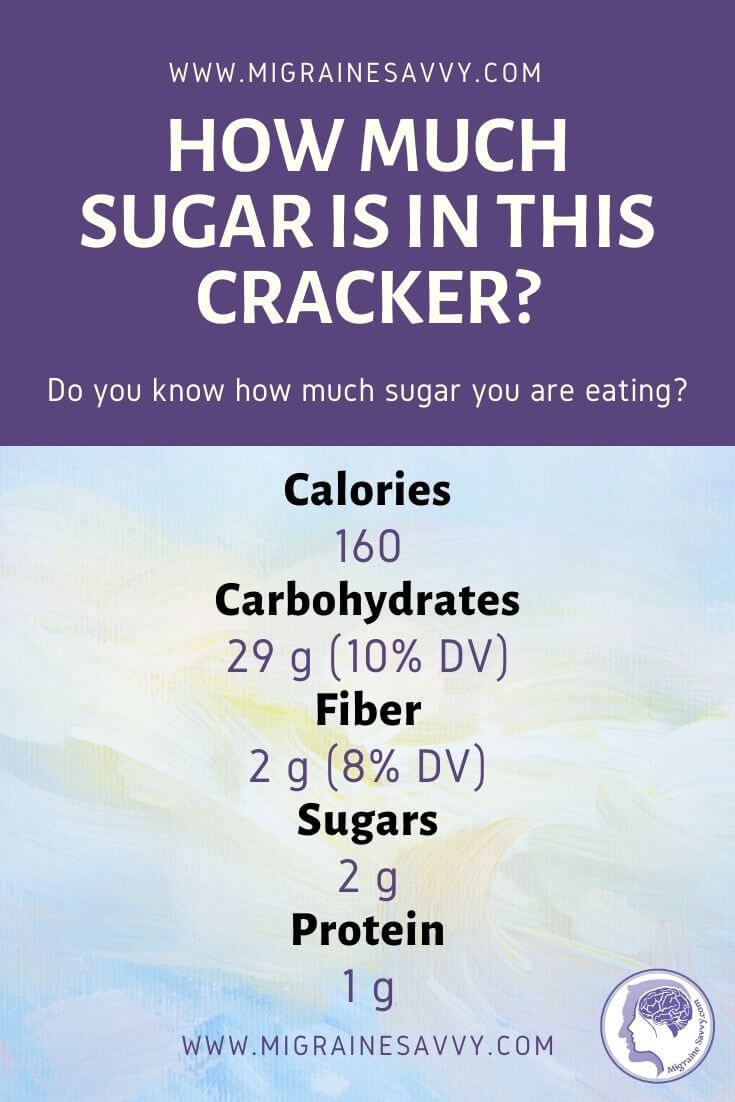 Does sugar cause migraine headaches? And if so, how much?
Does sugar cause migraine headaches? And if so, how much?How much is too much?
I might start with how much is too much. I just learned this about carbohydrates and I need to tell you because it shocked the heck out of me.
The sugar in Schär Gluten Free crackers!
27.5 grams / 6 in a packet = 4.58 carbs and 66 sodium as per packet
4 grams = 1 t sugar, so one cracker is over 4 grams of sugar
This means each cracker has more than one teaspoon of sugar... each single cracker.
**Note: Schär Brand is officially certified as Low FODMAP. I thought this would mean less sugar... but I was wrong.
What foods raise our blood glucose levels?
Everything you eat turns into glucose so the body can use it.
Even protein – meat! It’s just not as quick to raise it say like bread or actual sugar.
Let's look at carbohydrates – there are 2 kinds - simple and complex.
Carbohydrates such as sugar will raise your blood sugar levels quickly and cause them to spike. Anything sweet has carbs - fruit, carrots, sweet potatoes, pumpkin for example are complex.
And really high carb foods like soda, processed cereal, processed bread and bagels, potato or corn chips, and French fries cause that fast, high, spike are simple.
Complex carbs are slower to release glucose into the body than simple. This is a great way to say it...
You could say it this way, to use a very rough analogy. The sugars in the carrot are carefully packaged up, using a lot of scotch tape and wrapping paper. The sugars in the bagel are hardly packaged up at all – in fact, you just pop open the lid and there you are.
So the when you eat the bagel, the package is very quickly opened and your blood sugar levels rise very quickly.
When you eat the carrot, your body unwraps the sugars slowly, and so your blood sugar levels don’t spike the same way – the glucose is gradually added to your blood stream over time.
~ James Cottrill [1]
Now this gets complex because there are other differences with different types of sugar, which can make the body react differently. As this is such a big topic, let's just look at why this matters to us as people living with migraine.
The link between sugar and migraine and does sugar cause migraine headaches?
We already know that the migraine brain is super sensitive to sudden change. And a huge hit of sugar can cause a sudden change that automatically occurs in your body.
And to be clear, it is not a cause of migraine, but can be a trigger. I've written more about that here - Migraine Causes: How To Tell them From Triggers.
It can get very complicated because it (sugar) can also be an accumulated trigger. Meaning one instance may not trigger an attack, but if you eat a baked potato for 3 days in a row, for example, that may trigger an attack.
You will have to experiment to see if your attacks reduce or are eliminated by completely cutting out refined sugar (and carbs).
It gets even more complex…
"A study in 2009 suggested that migraineurs are also more likely (than the general population) to have impaired nitric oxide pathways." [1]
Nitric oxide is produced by nearly every type of cell in our body and it’s one of the most important molecules for blood vessel health. It's a vasodilator, meaning it relaxes the inner muscles of your blood vessels, causing the vessels to widen. In this way, nitric oxide increases blood flow and lowers blood pressure.
~ Healthline [5]
It also plays a role in inflammation and can influence how you feel pain. It has a role to play in preventing heart disease and can even effect your memory.
This could be a clue as to why people living with migraine may be more reactive and sensitive to refined sugars (and refined flours and simple carbohydrates) than most people. [1]
As a person living with migraine you should be aware of what causes your blood sugar levels to spike. One way to help you monitor this is by getting familiar with using the Glycemic Index. You can also completely cut sugar out of your diet for several months and monitor the outcome. [1]
Why does sugar trigger an attack?
Your body needs a certain amount of sugar to operate, and when you consume sugar it causes your blood glucose levels to fluctuate. Your brain needs a consistent flow of glucose, and when it doesn’t receive enough or gets too much, it responds negatively. This negative response triggers a headache or migraine. [4]
Too high or too low is not good. If your blood sugar is too high, you have Hyperglycemia. This is a medical condition where your body is unable to break down glucose with insulin, so your blood sugar rises (to 180-200 mg/dL). Symptoms that occur with hyperglycemia include frequent need to urinate, extreme thirst, blurry vision, or fatigue. [4]
Too low and you have a medical condition called Hypoglycemia. Your blood sugar can dip (below 70 mg/dL). You can experience hypoglycemia if you skip meals or only eat simple sugars, such as white sugar. Symptoms that accompany hypoglycemia include lightheadedness, weakness, pale skin, hunger, anxiety, dizziness, or sweating.
Either one of these conditions can cause headaches and migraine. [4]
So does sugar cause migraine headaches? It sure can. Too much or too little! Fasting, eating processed or high-sugar foods, dieting too rigorously, and skipping meals can all trigger an attack. Even delayed or irregular meals can make a difference because of your blood-glucose levels falling too low.
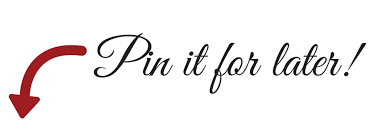
Why does sugar cause migraine headaches? Angela Stanton Ph.D. says that sugar takes water from the body (dehydrates it) so it's necessary to have some water with 1/8th tsp of salt about half an hour after eating high carbs or sugary foods. Dehydration is a well know migraine trigger.
Carbs...
Does sugar cause migraine headaches for you?
Carbohydrates = glucose /sugar.
It's best to consume carbohydrates in the form of fiber-rich foods like fruits, vegetables, whole grains, and nuts.
Here is a list of some high-carb foods that also happen to be incredibly healthy: quinoa, oats, buckwheat, bananas, sweet potatoes, beetroot, oranges, blueberries, grapefruit, apples, kidney beans, chickpeas.
"Carbohydrate foods are the main source of energy for your body. Your body breaks down carbohydrate from food into glucose, which then enters your bloodstream and is used by the body cells for energy. Glucose from carbohydrate foods is our body’s preferred fuel source. Nutritious carbohydrate foods provide fibre and resistant starch for a healthy digestive system as well as many other vitamins and minerals.
Foods that contain carbohydrate include:
- breads, cereals and other grains or starchy foods, like rice, quinoa and pasta
- starchy vegetables, like potato, sweet potato and corn
- legumes such as lentils, chickpeas and dried or canned beans
- fruit and fruit products
- dairy products, like milk and yoghurt
- sugary foods and drinks
- other sweet foods, like honey, maple syrup and other syrups.
Eating the right type and amount of carbohydrate foods will help manage your blood glucose levels." [2]
Foods surprisingly high in sugar
Any processed or packaged food will be high in sugar. These ones may surprise you, remembering that 4 grams = 1 teaspoon of sugar:
Vitamin and Energy Drinks:
- Snapple Antioxidant Water, Agave Melon: 20 ounce bottle = 32 grams sugar, 140 calories
- Glaceau Vitamin Water: 20 ounce bottle = 32 grams sugar, 125 calories
- Gatorade Bring It, Shine On, or Be Tough: 16 ounces = 28 grams sugar, 100 calories [3]
Yogurt
To enjoy yogurt without the added sugar, make your own flavored yogurt starting with plain yogurt. Or, buy the light yogurts that use alternative sweeteners like stevia. Organic coconut yogurt is my favorite.
- Yoplait Original 99% fat free, Lemon Burst: 6 ounces = 31 grams sugar, 180 calories
- Yoplait Thick & Creamy Yogurt, Strawberry: 6 ounces = 28 grams sugar, 180 calories
- Yoplait Original 99% fat free, Boysenberry: 6 ounces = 27 grams sugar, 170 calories [3]
Muesli and nut bars
Treat muesli and nut bars as a ‘sometimes’ snack as they can be high in kilojoules, added fat and sugar. Check the nutrition information panel to check the ingredients (sugars) and see if the product is a healthy option for you. [2]
Eat these only occasionally.
2 great resources...
National Diabetes Services Scheme - NDSS
Top 6 low glycemic foods
Does sugar cause migraine headaches for you? If so, try these foods to see if they are triggers as well. There's a testing method next.
Low-glycemic foods are slower to raise a person’s blood sugar levels than foods with moderate or high scores on the glycemic index. [6]
Here are the top 6 low GI foods:
1. Oats – 55
2. Milk – 37 to 39
3. Chickpeas – 28
4. Carrots – 39
5. Kidney beans – 24
6. Lentils – 32 [6]
Try this diet as an alternative
The ketogenic diet offers a great alternative to a carb based diet.
It is anti-inflammatory and neuroprotective. As a person living with migraine, you can help protect your sensitive nerve cells from getting overstimulated, over excited and then firing off.
The main goal is to train your metabolism to burn fat instead of glucose. Using high fat foods like organic coconut oil and avocado, for example, provides an excellent energy source for healthy cells.
But the main point is that you want low carbohydrates, high good fat, and a moderate protein intake.
I've written more about that here - Migraine and Diets: Is Ketogenic Just Another Fad
Does sugar cause migraine headaches for you?
The only way to find out for sure is to experiment and see what happens, but be sure to keep a journal. If you'd like more help, there is a food experiment journal in my course - Migraine Pain Management Course
TEST & MONITOR
Angela Stanton Ph.D., author of The Migraine Epidemic, suggests testing 1/2 cup of blueberries first to see if that triggers an attack. Then she suggests testing 1/2 a baked potato and then a whole baked potato. Keep a journal, monitor your results. Test it once to see and then test 2 days in a row, then test 3 days in a row.
But wait a week or so in between testing.
Until next time, be well and be pain free.
WANT HELP WITH FOOD ?
MIGRAINE PAIN MANAGEMENT COURSE
A structured 8-week food experiment designed to help you identify patterns and refine your migraine prevention strategy → click here
Ready to take the next step?
Choose the next step that fits where you are right now.
MIGRAINE CAUSES Related Articles
Does Sugar Cause Migraine Headaches Page References:
1. Cottrill, James (2012) Sugar and Migraines? Available [online] at: http://headacheandmigrainenews.com/sugar-and-migraines/
2. NDSS - National Diabetes Services Scheme (2021) Making healthy food choices fact sheet. Available [online] at: https://www.ndss.com.au/about-diabetes/resources/find-a-resource/making-healthy-food-choices-fact-sheet/
3. WebMd Archives. Sugar Shockers: Foods Surprisingly High in Sugar. Available [online]: https://www.webmd.com/food-recipes/features/sugar-shockers-foods-surprisingly-high-in-sugar
4. Nova Headache Center (2021) why does sugar trigger my migraines? Available [online] at: https://www.noveraheadachecenter.com/single-post/2020/06/29/Why-Does-Sugar-Trigger-My-Migraines
5. Healthline (2021) 5 Ways Nitric Oxide Supplements Boost Your Health and Performance. Available [online] at: https://www.healthline.com/nutrition/nitric-oxide-supplements
6. Medical News Today (2019) What are the best low-glycemic foods? Available [online] at: https://www.medicalnewstoday.com/articles/324871#how-the-scale-works
Does Sugar Cause Migraine Headaches Uploaded 19/05/21
